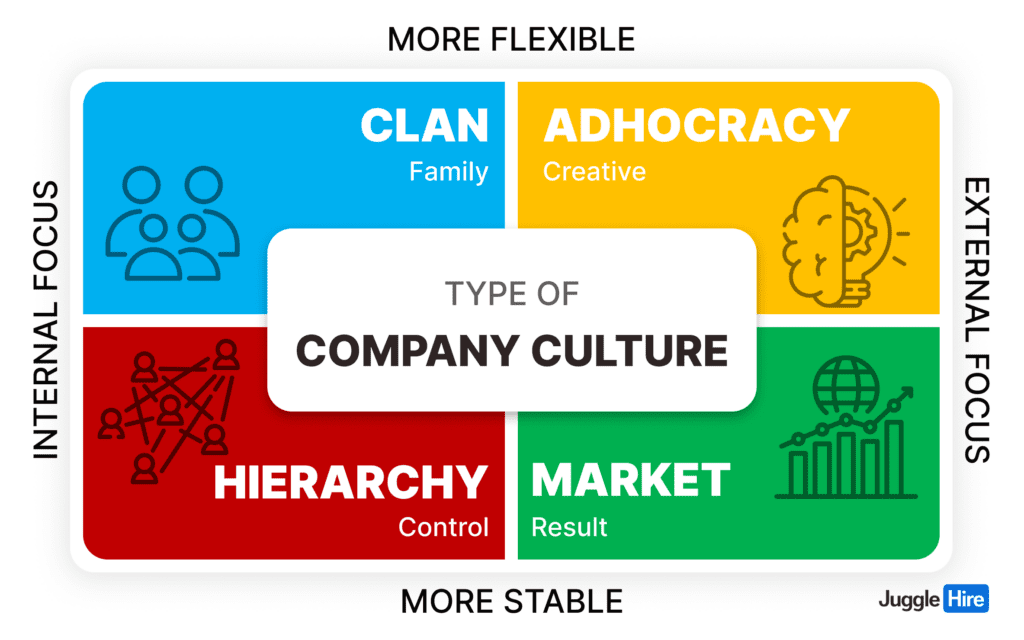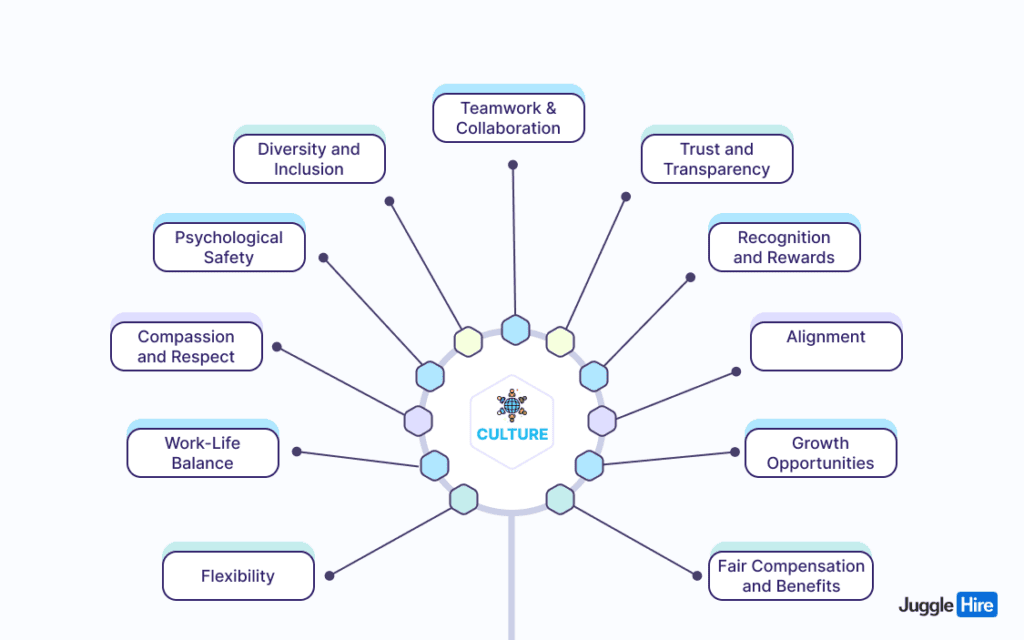8 Key Importance of Company Culture (and How to Build One)

Company culture is an invisible force that shapes how work gets done. It influences everything from employee morale to business outcomes. So, the importance of company culture is paramount.
Employees are no longer just looking for a job – they are seeking a sense of belonging and purpose. They want to work for companies where they feel valued and supported.
In fact, studies show that a staggering 35% of American workers would pass up a perfect job opportunity if the company culture didn’t match their values.
Furthermore, a whopping 91% of managers prioritize a candidate’s cultural fit over their experience.
But what exactly is company culture, and why does it matter? Let’s dive in and uncover the power of this dynamic force within your company.
What is Company Culture?

Company culture refers to the collective values, attitudes, behaviors, and standards that shape the atmosphere of a workplace. It’s essentially the vibe you get when you walk through the office doors. Think of it as the DNA of a company’s environment. It influences how people interact and work together.
When a company has a strong culture, it’s like magic happens. Employees are not just clocking in and out; they’re genuinely invested and excited about their work. This enthusiasm isn’t just reserved for the newbies; it extends all the way up to the bigwigs in leadership positions.
An important aspect of a healthy culture is clarity. Everyone knows what’s expected of them, how their role contributes to the bigger picture, and how they’re supposed to treat their colleagues. It’s like having a roadmap that guides behavior and decision-making.
Moreover, the importance of culture isn’t just about lofty values written on a poster; it’s about how those values come alive in the day-to-day grind. It’s about walking the talk, where the company’s vision and values aren’t just empty words but actively shape the way people work and interact.
So, in a nutshell, company culture is the secret sauce that makes a workplace more than just a place to earn a paycheck. It’s what turns a group of individuals into a cohesive team, marching together towards common goals.
4 Major Types of Company Culture

When it comes to company culture, there’s no one-size-fits-all approach. It’s like trying to find the perfect pair of shoes – what works for one person might not work for another. But to give you a sense of the landscape, let’s explore four common types of company culture:
01. Adhocracy Culture
Imagine a place where innovation is the name of the game. This culture is all about thinking outside the box, pushing boundaries, and moving at lightning speed. It’s like being in a constant brainstorming session, where new ideas are not just welcomed but celebrated.
02. Clan Culture
Picture a big, happy family where everyone’s got each other’s backs. That’s the vibe of a clan culture. It’s all about collaboration, teamwork, and building strong relationships. People here aren’t just colleagues; they’re like your work family, supporting you through thick and thin.
03. Hierarchy Culture
In this setup, it’s all about structure and order. Think of it as a well-oiled machine, where everyone knows their place and follows the established rules and processes. It’s like clockwork, with clear lines of authority and defined roles.
04. Market Culture
This culture is all about the hustle. It’s like being in a high-stakes game where the only thing that matters is winning. People here are driven by goals, targets, and results. It’s fast-paced, competitive, and focused on getting things done.
What Defines a Positive Company Culture?

Creating a positive company culture isn’t rocket science, but it does take some thought and effort. So, what exactly makes a workplace culture healthy and happy? Let’s break it down:
>> Teamwork and Collaboration: It’s all about fostering an environment where people can work together seamlessly, like a well-oiled machine. When teams click, magic happens.
>> Recognition and Rewards: Everyone loves a pat on the back, right? Recognizing and celebrating employee wins, big or small, keeps morale high and motivation soaring.
>> Alignment: Words and actions should be in sync. When the company talks the talk and walks the walk, employees feel confident and inspired.
>> Growth Opportunities: Nobody wants to feel stuck in a rut. Providing avenues for learning and development keeps employees engaged and invested in their future.
>> Fair Compensation and Benefits: Let’s be real – money matters. Offering competitive pay and perks shows employees that their hard work is valued.
>> Trust and Transparency: Open communication and honesty build strong bonds between teams and leadership. When there’s trust, everyone wins.
>> Flexibility: Life happens, right? Offering flexibility in how and where work gets done shows that the company cares about employees’ well-being.
>> Work-Life Balance: Burnout is no joke. Encouraging a healthy balance between work and play keeps minds fresh and creativity flowing.
>> Compassion and Respect: Treat others how you want to be treated. Simple as that. A little kindness goes a long way in creating a supportive environment.
>> Psychological Safety: Feeling safe to speak up and share ideas without fear of judgment is crucial. When employees feel heard and valued, innovation thrives.
>> Diversity and Inclusion: Embracing differences makes us stronger. A diverse and inclusive workforce brings fresh perspectives and drives innovation.
The Importance of Company Culture: 8 Reasons for Building a Strong Company Culture

The importance of company culture can’t be overstated. It’s like the glue that holds everything together and sets the tone for how things get done. Here’s why it matters:
01. Draws Complementary Minded People
A killer company culture acts like a beacon, drawing in folks who vibe with your values and mission. When employees feel a connection, they’re more likely to bring their A-game to work. It boosts job satisfaction and performance.
02. Drives Innovation and Teamwork
When your team is jazzed about your culture, it’s like a creativity explosion waiting to happen. Engaged employees are more productive and less likely to call in sick, making magic moments for your business.
03. Enhances Workplace Participation
A culture that’s all about keeping employees happy and engaged is a retention powerhouse. Happy campers stick around, cutting down on turnover and the headaches (and costs) that come with it.
04. Builds a Stellar Reputation
Word travels fast, especially in the business world. A solid company culture not only keeps employees smiling but also gives your brand a shiny halo. Prospective hires flock to companies known for treating their people right, giving you a leg up in the talent game.
05. Reduce Turnover
In today’s cutthroat job market, keeping your best and brightest on board is no easy feat. But when employees feel valued and respected, they’re more likely to stick around. A culture that celebrates individual wins and team triumphs fosters a sense of belonging and shared success.
This reduces turnover and creates an infectious positive vibe. Plus, happy employees become your biggest cheerleaders, bringing in top talent through word of mouth.
06. Boost ROI
Yup, you read that right – a killer culture equals cold, hard cash. Studies show that a healthy culture translates to better performance and happier employees. When folks feel good about where they work, they’re more productive and less likely to burn out, driving up that ROI (Return on Investment).
07. Brings a More Diverse Workforce
A vibrant culture isn’t just about beanbag chairs and ping-pong tables; it’s about embracing diversity in all its forms. A workplace that values different perspectives and backgrounds fosters creativity and innovation. Ultimately, it gives your team a competitive edge.
08. Reflects the Company’s Core Values
Your culture isn’t just a poster on the wall – it’s a living, breathing embodiment of your company’s core values. How you do business, treat your team, and interact with customers all add up to the experience of working with you.
When your culture aligns with your values, it’s like a beacon guiding your ship through stormy seas. But if there’s a disconnect between what you say and what you do, it’s time to hit the reset button.
You might be interested in –
Top 10 Trends You Must Follow As a Recruiter
How to Build a Strong Company Culture?

Building a strong company culture is like laying the foundation for a skyscraper – it’s gotta be solid from the ground up. Here’s how to get started:
I) Define Your Values
Your values are the North Star guiding your culture. Gather your leadership team and hash out what matters most to your company. Whether it’s sustainability, respect, or innovation, clarity on your values sets the tone for everything else.
II) Set Goals
Just like hitting sales targets, building a culture takes goals. Identify how you want your values to show up in your day-to-day operations. If diversity is key, aim to boost diverse hires and create an inclusive atmosphere. If work-life balance is a priority, set goals like ensuring every employee takes ample vacation time.
III) Ask Your Team
Your employees are the heartbeat of your culture. Tap into their wisdom by gathering feedback through surveys and conversations. What do they love about the current culture? What could be better? Use their insights to fine-tune your strategy and create a culture that works for everyone.
IV) Integrate Culture Into Daily Life
Individuals feel the importance of company culture more than ever. Company culture teaches them how to engage in work and the work environment. So, weave your values into the fabric of your organization. Offer perks like paid time off for cultural holidays or establish communication policies that respect work-life balance.
Make sure your culture isn’t just lip service but something employees feel in their bones every time they clock in.
Also Learn –
Killer Recruitment Tips That You Need to Learn Today!
How Do You Assess the Culture of Your Company?
Figuring out the vibe of your company’s culture isn’t as tricky as it sounds. Here’s how to get a pulse on what’s really going on:
>> Chat with Leaders: Start by sitting down with the bigwigs and asking them to spill the beans on what they think the culture is all about. Their perspective can offer valuable insights into the company’s values and priorities.
>> Hear it Straight from the Horse’s Mouth: Next up, talk to the real experts – your employees. Ask them to draw on their experience working at the company. What’s great? What could be better? Their firsthand accounts can give you the inside scoop on what’s really happening behind the scenes.
>> Check for Consistency: Now, compare what the leaders say with what the employees are saying. Is there alignment between the two? If everyone’s singing from the same hymn sheet, that’s a good sign. But if there’s a disconnect, it’s time to dig deeper and figure out why.
>> Spot the Values in Action: Take a peek at the day-to-day grind and see if you can spot the company’s values in action. Are people walking the talk, or is it all just talk? Seeing those values come to life in the workflow tells you a lot about the culture’s real deal.
>> Dive into the Feedback: Employee surveys and exit interviews are treasure troves of juicy info about your culture. Dive in and see what themes emerge. Are folks feeling engaged and fulfilled, or are they itching to jump ship? The answers might surprise you.
>> Track the Numbers: Last but not least, keep an eye on those engagement and retention metrics. High turnover or low morale can be red flags that something’s amiss in the culture department.
Bonus: 4 Tips for Improving Your Company Culture
You have learned the importance of company culture. So, your task is to improve it. Don’t worry – improving your company culture doesn’t have to be rocket science. Here are some straightforward tips to get you started:
a) Show Appreciation
People love a pat on the back, plain and simple. Make recognition a cornerstone of your culture by encouraging managers to dish out verbal “thank yous” for a job well done. A little appreciation goes a long way in boosting morale and keeping folks happy.
b) Offer Flexibility
In today’s world, flexibility is the name of the game. Whether it’s remote work options, flexible schedules, or hybrid arrangements, giving employees the freedom to work how and where they want can do wonders for morale. Plus, it shows you trust your team to get the job done, no matter where they are.
c) Competitive Compensation and Benefits
Let’s face it – money talks. Make sure your salary and benefits packages are up to snuff by doing your homework on industry standards. If you want to attract and retain top talent, you’ve gotta put your money where your mouth is. That is when you acknowledge the importance of company culture.
d) Check in Regularly
You won’t know what needs fixing if you don’t ask. Make it a habit to check in with your employees regularly and solicit feedback on how to make their work experience better. Whether it’s through one-on-one meetings, surveys, or suggestion boxes, giving folks a voice shows you care about their well-being.
A recruitment software can assist in developing a prominent company culture. But first, you should be aware of the potential benefits of using recruitment software in this modern age. Perhaps, you can work better on updating your company culture after learning these benefits.
FAQs on The Importance of Company Culture
What are the most important aspects of culture?
The most important aspects of culture include open communication, mutual respect, shared goals, and a commitment to employee growth and development.
What is the importance of organizational culture?
Organizational culture is super important because it affects everything in your business, like how people talk to each other, the rules, and even stuff like benefits. When the culture matches what employees want, they feel happier and more valued.
What is a positive work culture?
A positive work culture is when everyone, from the big bosses to the newest hires, lives and breathes the company’s values. It’s all about making sure the employee experience matches what the company believes in.
What are the 5 pillars of culture?
The 5 pillars of culture are good communication, employees feeling engaged, being able to change when needed, having a clear mission and values, and having strong leadership.
How important is culture in retention?
Culture is like glue when it comes to keeping employees around. If they’re happy and feel supported, they’re more likely to stick around for the long haul.
The Importance of Company Culture- Ending Note
Company culture is not just a nice-to-have; it’s a must-have for any organization looking to thrive in today’s fast-paced world. It’s the glue that holds teams together, the driving force behind employee engagement and satisfaction, and the secret ingredient in building a successful business.
In essence, the importance of company culture is a lot. It isn’t just a reflection of a company’s values – it’s the foundation upon which its success is built. So, whether you’re a startup or a Fortune 500 company, never underestimate the power of a strong and vibrant company culture.
That being said, if you have any feedback regarding this blog, feel free to share that with us using the comment box below. We would love to hear from you.

I think work feasibility is also one of the main aspect of a company culture.
Thanks a for pointing out.. However, it depends on the company’s current position and environment.